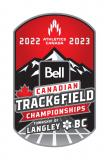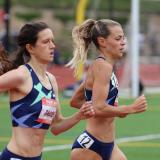Folders |
Preview - Men's Events - Canadian Olympic and Paralympic Track and Field TrialsPublished by
Drouin looking to remain in contention to defend Olympic high jump title against deep field, along with Philibert-Thiboutot seeking trip to Tokyo in 1,500 meters; Warner and LePage both working on improvement in certain events for decathlon, with Gay pursuing steeplechase standard The following is a chronological breakdown of all men’s events at the Canadian Olympic and Paralympic Track and Field Trials at the Claude-Robillard Sports Complex in Montreal, Quebec By Erik Boal, DyeStat Editor Men’s Decathlon Schedule: June 25-26 Olympic standard: 8,350 points Entries with the Olympic standard: None Athletes not competing with the Olympic standard: Pierce LePage, Damian Warner 2016 qualifier: Damian Warner Analysis: With Damian Warner the current world leader and No. 4 all-time competitor at 8,995 points and Pierce LePage ranking third globally this year at 8,534 points, this is one of the strongest events for Canada entering the Olympics. Taylor Ehrhardt, who boasts a lifetime-best 7,882 points from 2017 and last completed a decathlon with a 7,715-point effort in 2019, is a strong favorite to win the competition with no other athletes having scored more than 7,000, but will need several personal-best performances to build enough momentum to challenge the Olympic standard. Men’s 400 Meters Schedule: June 25 Olympic standard: 44.90 Entries with the Olympic standard: None Athletes not competing with the Olympic standard: None 2016 qualifiers: None Analysis: Philip Osei produced a 45.76 effort May 1 at LSU, but will need to get closer to his 2015 personal-best 45.23 to have an opportunity to qualify for Tokyo. The good news for Osei is only 18 athletes with the Olympic standard currently count against the maximum 48 entries that are capable of qualifying. A performance in the low 45s by either Osei or Myles Misener-Daley could propel them high enough in the World Rankings quota in order to be selected, even without the automatic qualifier. Thomas Normandeau and Zachary Gingras are the Paralympic athletes expected to participate. Men’s 100-Meter Dash Schedule: June 25 Olympic standard: 10.05 Entries with the Olympic standard: Aaron Brown Athletes not competing with the Olympic standard: Andre De Grasse 2016 qualifiers: Aaron Brown, Andre De Grasse, Akeem Haynes Analysis: Aaron Brown ran 9.96 at the 2019 Canadian Championships, but hasn’t achieved a sub-10 performance under any conditions since. Although he is expected to place more emphasis on the 200 this summer, Brown is scheduled to compete in the 100 for the first time since April, and his presence could be instrumental in Bolade Ajomale or Gavin Smellie potentially achieving the Olympic standard. Austin Ingram is the lone Paralympic entry scheduled to compete. Men’s Long Jump Schedule: June 25 Olympic standard: 26-11.75 (8.22m) Entries with the Olympic standard: Damian Warner Athletes not competing with the Olympic standard: None 2016 qualifiers: None Analysis: With a 27-2 (8.28m) effort on the first day of the Hypo Meeting on May 29 in Gotzis, Damian Warner achieved a national record – also the best mark ever achieved in a decathlon, surpassing the 27 feet (8.23m) produced in 2012 by Ashton Eaton – and is scheduled to participate in the event in Montreal, although he will only be focused on the decathlon in Tokyo. Fellow decathlete Pierce LePage, who has a personal-best 25-7.25 (7.80m) from 2019, is also entered, joining Jesse Thibodeau and Stevens Dorcelus in looking to surpass the 8-meter mark. Men’s 800 Meters Schedule: June 25 Olympic standard: 1:45.20 Entries with the Olympic standard: None Athletes not competing with the Olympic standard: Marco Arop, Brandon McBride 2016 qualifiers: Brandon McBride, Anthony Romaniw Analysis: Robert Heppenstall, a seven-time All-American at Wake Forest, ran 1:46.26 in 2017, but will need to drop more than a full second in order to make a legitimate push to achieve the Olympic standard or elevate significantly in the World Rankings. He made big strides June 18 by running 1:46.73 in Toronto, but without Marco Arop or Brandon McBride present to push the pace, Heppenstall will have to do the work on his own in order to give himself an opportunity to race again in Tokyo. Mohand Zine Khelaf ran a personal-best 1:47.32 on May 29 at the Portland Track Festival, but still has a lot of ground to cover in order to get closer to the Olympic standard. Men’s 3,000-Meter Steeplechase Schedule: June 25 Olympic standard: 8:22.00 Entries with the Olympic standard: None Athletes not competing with the Olympic standard: Matthew Hughes 2016 qualifiers: Matthew Hughes, Taylor Milne, Chris Winter Analysis: John Gay, who ran 8:23.52 on May 28 at the Portland Track Festival, finds himself in a favorable position in the World Rankings, but wants to leave nothing to chance by achieving the Olympic standard to join Matthew Hughes on the Canadian roster. Jean-Simon Desgagnes ran 8:24.40 at the Portland Track Festival and Oklahoma State All-American Ryan Smeeton clocked 8:27.90 in 2019, but both appear to be too far down the World Rankings list to be considered, leaving Gay as the favorite to win the title and potentially becoming the second Canadian athlete to qualify for the Tokyo in the event. Men’s Shot Put Schedule: June 25 Olympic standard: 69-2.75 (21.10m) Entries with the Olympic standard: None Athletes not competing with the Olympic standard: Tim Nedow 2016 qualifier: Tim Nedow Analysis: Although none of the competitors are expected to join Tim Nedow in qualifying to throw in Tokyo, there should be a good battle involving Eli Pawliw and Mark Bujnowski. Pawliw has only competed twice this year and hasn’t surpassed the 18-meter mark since achieving his personal-best 60-6.75 (18.46m) in August 2019. Bujnowski has been active with three victories in less than a week in Ontario to build momentum entering the championship meet, but also hasn’t surpassed the 18-meter barrier outdoors since July 2019, although he did achieve that level four times at indoor meets last year, including a 61-0.75 (18.61m) performance in Michigan. Men’s 110-Meter Hurdles Schedule: June 26 Olympic standard: 13.32 Entries with the Olympic standard: None Athletes not competing with the Olympic standard: None 2016 qualifiers: Johnathan Cabral, Sekou Kaba Analysis: Damian Warner and Pierce LePage are also expected to participate here in order to get competition in the event before the decathlon in Tokyo, with Warner looking to return closer to his personal-best 13.27 from 2015. LePage ran a lifetime-best 14.05 in Gotzis, but running under 14 seconds would help his development significantly in the multi-events. Payne Wylie and Craig Thorne are the only other entries besides Warner with sub-14 credentials, as it appears Canada might be shut out in this event at the Olympics after several years of Johnathan Cabral competing at global championships. Men’s 200 Meters Schedule: June 26 Olympic standard: 20.24 Entries with the Olympic standard: Aaron Brown Athletes not competing with the Olympic standard: Andre De Grasse 2016 qualifiers: Aaron Brown, Andre De Grasse, Brendon Rodney Analysis: Aaron Brown has run 20.25 this year and is motivated to achieve a sub-20 performance for the first time since his personal-best 19.95 in Switzerland in July 2019 in order to give him the confidence to compete with Andre De Grasse and the rest of the world’s elite in Tokyo. Brendon Rodney, who has run 20.49 this year and clocked 20.33 in 2019 on his way to the semifinals at the World Championships in Doha, Qatar, has the most to gain with a strong performance in Montreal. Rodney is in good standing in the World Rankings, but achieving the Olympic standard or running under 20.30 again would be beneficial in building momentum, not only individually, but for Canada in the 4x100 relay. Men’s Hammer Throw Schedule: June 26 Olympic standard: 254-3 (77.50m) Entries with the Olympic standard: None Athletes not competing with the Olympic standard: None 2016 qualifiers: None Analysis: Ethan Katzberg recently achieved the Canadian Under-20 record May 23 with a 255-9 (77.97m) performance with the 6-kilogram implement. Katzberg, who will be throwing with the 7.26-kilogram hammer in this competition, boasts a top mark from April of 227-10 (69.45m). Adam Keenan, who competed for Northern Arizona, has the best opportunity to achieve the Olympic standard following a 247-foot effort (75.29m) on June 5. Keenan has been consistently over 70 meters at every event the past six weeks, but will need to summon a significant performance in order to at least move into the top 32 in the World Rankings to be considered to compete in Tokyo. Rowan Hamilton has thrown 247-2 (75.35m) with the 6-kilogram implement and launched the 7.26-kilogram hammer 234-8 (71.53m). Men’s 5,000 Meters Schedule: June 26 Olympic standard: 13:13.50 Entries with the Olympic standard: Lucas Bruchet Athletes not competing with the Olympic standard: Moh Ahmed, Justyn Knight 2016 qualifiers: Moh Ahmed, Lucas Bruchet Analysis: One of the stars at the Harry Jerome Classic, Lucas Bruchet ran 13:12.56 to achieve the Olympic standard and join Moh Ahmed and Justyn Knight on the Canadian roster to race in Tokyo. Bruchet’s presence here could hopefully elevate Ben Flanagan and Mike Tate to run under 13:20, but either athlete would need to run faster than Bruchet did June 12 in order to bump him from the team, since Ahmed and Knight have both produced sub-13 performances. Men’s 1,500 Meters Schedule: June 27 Olympic standard: 3:35.00 Entries with the Olympic standard: None Athletes not competing with the Olympic standard: Justyn Knight 2016 qualifiers: Nathan Brannen, Charles Philibert-Thiboutot Analysis: The path for Charles Philibert-Thiboutot is clear to return to the Olympics, and it all rests on his ability to produce a sub-3:35 performance in the final individual track race of the meet. Justyn Knight has qualified for the event, but is expected to focus only on the 5,000 in Tokyo, leaving the door wide open for Philibert-Thiboutot, who ran 3:36.44 on June 1 in Montreal. He hasn’t run under 3:35 since 2016 in Monaco, and has only achieved the feat twice in his career, so it will take a strong individual effort and possibly some good competition up front with Cameron Proceviat in order for Philibert-Thiboutot to become an Olympian once again. Men’s Discus Throw Schedule: June 27 Olympic standard: 216-6 (66.00m) Entries with the Olympic standard: None Athletes not competing with the Olympic standard: None 2016 qualifiers: None Analysis: Jordan Young started the spring strong with a pair of 64-meter performances, but he will need to return to that level and find even more in order to make a push for the Olympic standard or move into the top 32 in the World Rankings. Young achieved a personal-best 212-8 (64.84m) in April in Virginia, but with 27 entries already qualifying automatically to throw in Tokyo, he would likely need to add another three feet to find himself in a more favorable position for Olympic consideration. Jesse Zesseu is the only Paralympic competitor scheduled to throw. Men’s High Jump Schedule: June 27 Olympic standard: 7-7.75 (2.33m) Entries with the Olympic standard: None Athletes not competing with the Olympic standard: None 2016 qualifiers: Derek Drouin, Michael Mason Analysis: The meet will showcase one of its deepest competitions on the final day, with three of the top eight high jumpers in Canadian history in Derek Drouin, Michael Mason and Django Lovett concluding the meet in exciting fashion. Drouin, the reigning Olympic champion, has his work cut out in order to put himself in position to defend his title. Drouin has only cleared 7-4.25 (2.24m) this year and hasn’t been over 7-5 (2.26m) since 2017. Mason, who cleared 7-6.50 (2.30m) on June 12 at Harry Jerome, is in a strong position to qualify for Tokyo even without the Olympic standard. Django Lovett cleared 7-6 (2.29m) on May 22 in Arizona, but likely needs to surpass 7-6.50 here in order to join Mason jumping in Tokyo. More news |








